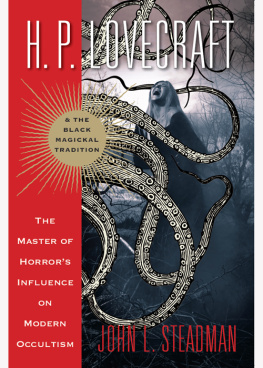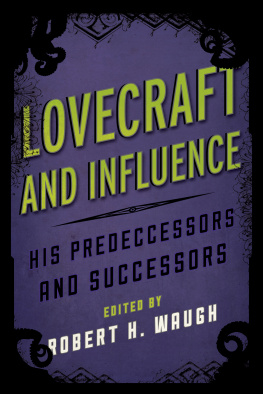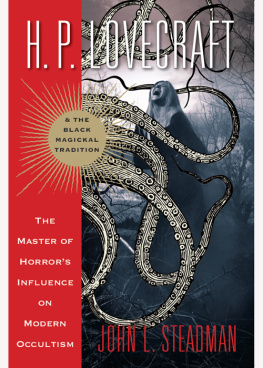Howard Lovecraft - He
Here you can read online Howard Lovecraft - He full text of the book (entire story) in english for free. Download pdf and epub, get meaning, cover and reviews about this ebook. genre: Science fiction. Description of the work, (preface) as well as reviews are available. Best literature library LitArk.com created for fans of good reading and offers a wide selection of genres:
Romance novel
Science fiction
Adventure
Detective
Science
History
Home and family
Prose
Art
Politics
Computer
Non-fiction
Religion
Business
Children
Humor
Choose a favorite category and find really read worthwhile books. Enjoy immersion in the world of imagination, feel the emotions of the characters or learn something new for yourself, make an fascinating discovery.

- Book:He
- Author:
- Genre:
- Rating:4 / 5
- Favourites:Add to favourites
- Your mark:
- 80
- 1
- 2
- 3
- 4
- 5
He: summary, description and annotation
We offer to read an annotation, description, summary or preface (depends on what the author of the book "He" wrote himself). If you haven't found the necessary information about the book — write in the comments, we will try to find it.
He — read online for free the complete book (whole text) full work
Below is the text of the book, divided by pages. System saving the place of the last page read, allows you to conveniently read the book "He" online for free, without having to search again every time where you left off. Put a bookmark, and you can go to the page where you finished reading at any time.
Font size:
Interval:
Bookmark:
He
by Howard Philips Lovecraft
I saw him on a sleepless night when I was walking desperately to save my soul and my vision. My coming to New York had been a mistake; for whereas I had looked for poignant wonder and inspiration in the teeming labyrinths of ancient streets that twist endlessly from forgotten courts and squares and waterfronts to courts and squares and waterfronts equally forgotten, and in the Cyclopean modern towers and pinnacles that rise blackly Babylonian under waning moons, I had found instead only a sense of horror and oppression which threatened to master, paralyze, and annihilate me.
The disillusion had been gradual. Coming for the first time upon the town, I had seen it in the sunset from a bridge, majestic above its waters, its incredible peaks and pyramids rising flowerlike and delicate from pools of violet mist to play with the flaming clouds and the first stars of evening. Then it had lighted up window by window above the shimmering tides where lanterns nodded and glided and deep horns bayed weird harmonies, and had itself become a starry firmament of dream, redolent of faery music, and one with the marvels of Carcassonne and Samarcand and El Dorado and all glorious and half-fabulous cities. Shortly afterward I was taken through those antique ways so dear to my fancy-narrow, curving alleys and passages where rows of red Georgian brick blinked with small-paned dormers above pillared doorways that had looked on gilded sedans and paneled coaches and in the first flush of realization of these long-wished things I thought I had indeed achieved such treasures as would make me in time a poet.
But success and happiness were not to be. Garish daylight showed only squalor and alienage and the noxious elephantiasis of climbing, spreading stone where the moon had hinted of loveliness and elder magic; and the throngs of people that seethed through the flume-like streets were squat, swarthy strangers with hardened faces and narrow eyes, shrewd strangers without dreams and without kinship to the scenes about them, who could never mean aught to a blue-eyed man of the old folk, with the love of fair green lanes and white New England village steeples in his heart.
So instead of the poems I had hoped for, there came only a shuddering blackness and ineffable loneliness; and I saw at last a fearful truth which no one had ever dared to breathe before the unwhisperable secret of secrets the fact that this city of stone and stridor is not a sentient perpetuation of Old New York as London is of Old London and Paris of Old Paris, but that it is in fact quite dead, its sprawling body imperfectly embalmed and infested with queer animate things which have nothing to do with it as it was in life. Upon making this discovery I ceased to sleep comfortably; though something of resigned tranquillity came back as I gradually formed the habit of keeping off the streets by day and venturing abroad only at night, when darkness calls forth what little of the past still hovers wraith-like about, and old white doorways remember the stalwart forms that once passed through them. With this mode of relief I even wrote a few poems, and still refrained from going home to my people lest I seem to crawl back ignobly in defeat.
Then, on a sleepless night's walk, I met the man. It was in a grotesque hidden courtyard of the Greenwich section, for there in my ignorance I had settled, having heard of the place as the natural home of poets and artists. The archaic lanes and houses and unexpected bits of square and court had indeed delighted me, and when I found the poets and artists to be loud-voiced pretenders whose quaintness is tinsel and whose lives are a denial of all that pure beauty which is poetry and art, I stayed on for love of these venerable things. I fancied them as they were in their prime, when Greenwich was a placid village not yet engulfed by the town; and in the hours before dawn, when all the revellers had slunk away, I used to wander alone among their cryptical windings and brood upon the curious arcana which generations must have deposited there. This kept my soul alive, and gave me a few of those dreams and visions for which the poet far within me cried out.
The man came upon me at about two one cloudy August morning, as I was threading a series of detached courtyards; now accessible only through the unlighted hallways of intervening buildings, but once forming parts of a continuous network of picturesque alleys. I had heard of them by vague rumor, and realized that they could not be upon any map of today; but the fact that they were forgotten only endeared them to me, so that I had sought them with twice my usual eagerness. Now that I had found them, my eagerness was again redoubled; for something in their arrangement dimly hinted that they might be only a few of many such, with dark, dumb counterparts wedged obscurely betwixt high blank walls and deserted rear tenements, or lurking lamplessly behind archways unbetrayed by hordes of the foreign-speaking or guarded by furtive and uncommunicative artists whose practises do not invite publicity or the light of day.
He spoke to me without invitation, noting my mood and glances as I studied certain knockered doorways above iron-railed steps, the pallid glow of traceried transoms feebly lighting my face. His own face was in shadow, and he wore a wide-brimmed hat which somehow blended perfectly with the out-of-date cloak he affected; but I was subtly disquieted even before he addressed me. His form was very slight; thin almost to cadaverousness; and his voice proved phenomenally soft and hollow, though not particularly deep. He had, he said, noticed me several times at my wanderings; and inferred that I resembled him in loving the vestiges of former years. Would I not like the guidance of one long practised in these explorations, and possessed of local information profoundly deeper than any which an obvious newcomer could possibly have gained?
As he spoke, I caught a glimpse of his face in the yellow beam from a solitary attic window. It was a noble, even a handsome elderly countenance; and bore the marks of a lineage and refinement unusual for the age and place. Yet some quality about it disturbed me almost as much as its features pleased me perhaps it was too white, or too expressionless, or too much out of keeping with the locality, to make me feel easy or comfortable. Nevertheless I followed him; for in those dreary days my quest for antique beauty and mystery was all that I had to keep my soul alive, and I reckoned it a rare favor of Fate to fall in with one whose kindred seekings seemed to have penetrated so much farther than mine.
Something in the night constrained the cloaked man to silence and for a long hour he led me forward without needless words; making only the briefest of comments concerning ancient names and dates and changes, and directing my progress very largely by gestures as we squeezed through interstices, tiptoed through corridors clambered over brick walls, and once crawled on hands and knees through a low, arched passage of stone whose immense length and tortuous twistings effaced at last every hint of geographical location I had managed to preserve. The things we saw were very old and marvelous, or at least they seemed so in the few straggling rays of light by which I viewed them, and I shall never forget the tottering Ionic columns and fluted pilasters and urn-headed iron fenceposts and flaring-linteled windows and decorative fanlights that appeared to grow quainter and stranger the deeper we advanced into this inexhaustible maze of unknown antiquity.
We met no person, and as time passed the lighted windows became fewer and fewer. The streetlights we first encountered had been of oil, and of the ancient lozenge pattern. Later I noticed some with candles; and at last, after traversing a horrible unlighted court where my guide had to lead with his gloved hand through total blackness to a narrow wooded gate in a high wall, we came upon a fragment of alley lit only by lanterns in front of every seventh house unbelievably Colonial tin lanterns with conical tops and holes punched in the sides. This alley led steeply uphill more steeply than I thought possible in this part of New York and the upper end was blocked squarely by the ivy-clad wall of a private estate, beyond which I could see a pale cupola, and the tops of trees waving against a vague lightness in the sky. In this wall was a small, low-arched gate of nail-studded black oak, which the man proceeded to unlock with a ponderous key. Leading me within, he steered a course in utter blackness over what seemed to be a gravel path, and finally up a flight of stone steps to the door of the house, which he unlocked and opened for me.
Font size:
Interval:
Bookmark:
Similar books «He»
Look at similar books to He. We have selected literature similar in name and meaning in the hope of providing readers with more options to find new, interesting, not yet read works.
Discussion, reviews of the book He and just readers' own opinions. Leave your comments, write what you think about the work, its meaning or the main characters. Specify what exactly you liked and what you didn't like, and why you think so.



